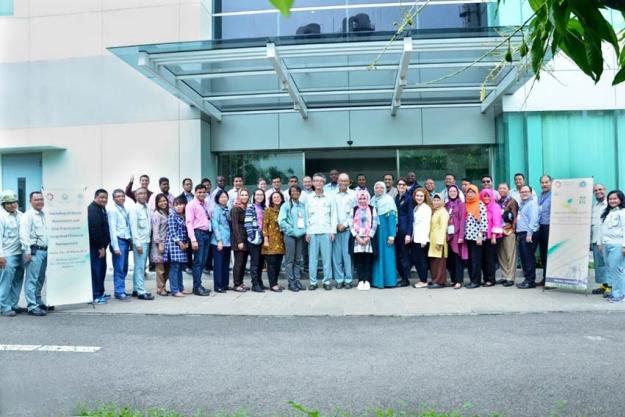
Participants at the Workshop on Needs Assessment and Best Practices on Integrated Chemical Management in Jakarta
THE HAGUE, Netherlands – 4 April 2017 – The Organisation for the Prohibition of Chemical Weapons (OPCW) championed knowledge sharing during a Workshop on Needs Assessment and Best Practices on Integrated Chemical Management held in Jakarta, Indonesia, 20 – 22 March.
The Workshop provided Member States with a professional forum to share and discuss government, private enterprise, and academic led initiatives related to integrated chemical management. More than 40 representatives from government agencies, chemical industries, academia and various other stakeholders attended the workshop from around the world.
“Integrated chemical management is crucial for ensuring the safe, secure and sustainable management of chemicals throughout their lifecycle,” the Director of the Upstream Chemical Industry, Ministry of Industry, Republic of Indonesia, Mr Muhammad Khayam, explained in his opening speech.
“Mismanagement can cause disastrous consequences, including industrial accidents and adverse health consequences for the consumers of daily necessities, such as food products, as well as lead to the redirection of chemicals for use in the production of chemical weapons and incidents of terrorism,” he concluded.
During the opening remarks by OPCW’s International Cooperation Officer, Mrs Halimatussaadiah Mat Som, special focus was placed on defining the three pillars of integrated chemical management: chemical safety, security and sustainability. “Chemical safety focuses on measures that reduce the risk of a chemical accident. Chemical security includes measures that minimise the risk of a chemical incident, while chemical sustainability strives to improve the efficiency of the use of natural resources and lifecycle management,” she stated.
Workshop participants shared needs, experiences, lessons learned and best practices related to integrated chemical management. During discussions, the technical and legislative aspects attracted particular attention.
The event offered the opportunity for this diverse set of professionals to build a common platform of international and cross-sector partnerships in integrated chemical management. Brainstorming sessions helped the emergence of many new ideas on how to confront some of the more intricate challenges in chemical management.
The participants visited the Indonesian chemical company, PT Nippon Shokubai, where they observed the practical application of integrated chemical management concepts.
“Expert exchanges such as this are an excellent way to bring professionals together, and help enhance chemical safety and security management across both developing and developed economies,” concluded one of the participants.
The OPCW will publish a report reflecting the discussions and outcomes of the workshop shortly.
The attendees represented 22 countries, including: Algeria, Bangladesh, Cameroon, Georgia, India, Indonesia, Iran, Jordan, Kenya, Malaysia, Mauritius, Mozambique, Nicaragua, Pakistan, Peru, Philippines, Qatar, Sri Lanka, Sudan, Venezuela, Vietnam and Zambia.
Background
The Workshop on Needs Assessment and Best Practices on Integrated Chemical Management has been designed to support the application of the Decision on the Components of an Agreed Framework for the Full Implementation of Article XI of the Chemical Weapons Convention (C 16/DEC.10, dated 1 December 2011).
In accordance with operative paragraph 2 of that Decision, OPCW States Parties and the Secretariat should “assist, in cooperation with other relevant international organisations, National Authorities to develop chemical safety and security education and training programmes as well as outreach activities in the field of integrated chemical management.”
Integrated chemical management relies on the cooperation of various stakeholders working jointly to ensure the safe, secure and sustainable management of chemicals throughout their lifecycle. Its unique holistic approach combines aspects of policy, industrial management, science and engineering.
Application of integrated chemical management lies at the heart of Associate Programme’s curriculum – a flagship OPCW capacity-building project for attendees from the countries with developing or transitional economies.
As the implementing body for the Chemical Weapons Convention, the OPCW oversees the global endeavour to permanently and verifiably eliminate chemical weapons. Since the Convention’s entry into force in 1997 – and with its 192 States Parties – it is the most successful disarmament treaty eliminating an entire class of weapons of mass destruction.
To date, nearly 95 per cent of all chemical weapon stockpiles declared by possessor States have been destroyed under OPCW verification. For its extensive efforts in eliminating chemical weapons, the OPCW received the 2013 Nobel Prize for Peace.
